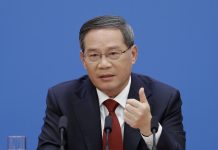The meeting between Chinese President Xi Jinping and his U.S. counterpart Joe Biden on the sidelines of the Asia-Pacific Economic Cooperation (APEC) Leaders’ Meeting in Lima, Peru, on November 16 garnered worldwide attention.
It was a moment for review and summary, as well as a demonstration of China’s commitment to global stability and progress. Amid an increasingly turbulent international environment, China remains steadfast in its pursuit of stability, cooperation and mutual respect.
China approaches its relationship with the U.S. with a clear understanding that these two nations represent the world’s most consequential bilateral relationship. Over the past four years, despite the occasional commotion and challenges, China has demonstrated resilience and commitment to maintaining a constructive dialogue.
Xi’s analogy of China-U.S. relations as being a “mansion” is both apt and insightful: The mansion’s foundation lies in the principles of mutual respect, peaceful coexistence and win-win cooperation, and its structural integrity relies on pillars of people-to-people exchange, effective management of differences and major-country responsibilities.
During the Chinese and U.S. presidents’ most recent talks, Xi proposed seven guiding principles for the relationship. They are: having a correct strategic perception, matching words with actions, treating each other as equals, not challenging redlines and paramount principles, conducting more dialogue and cooperation, responding to the expectations of the people and stepping forward to shoulder the responsibilities of major countries.
Historically, China and the U.S. have found ways to cooperate despite their differences. Whether it was fighting terrorism in the early 2000s, stabilizing the global economy during the 2008 financial crisis or coordinating responses to the 2014-16 Ebola epidemic in West Africa, both nations have shown that collaboration is always an option.
The lesson from history is clear: When China and the U.S. cooperate, both nations benefit; when they confront each other, both suffer. Xi emphasized that there is “no historical inevitability” behind the so-called “Thucydides Trap,” which suggests that competition between a rising power and an established power unavoidably leads to conflict. This serves as a reminder that the concept of a “new Cold War” is not only obsolete but also dangerous in today’s interconnected world. The rhetoric of confrontation and policies of containment are ultimately counterproductive. They harm not just China and the U.S., but also the broader global community.
A major theme of this meeting was continuity. Xi reiterated China’s four unchanged commitments: China remains committed to the goal of a stable, healthy and sustainable China-U.S. relationship; it continues to adhere to the principles of mutual respect, peaceful coexistence and win-win cooperation; it remains steadfast in safeguarding China’s sovereignty, security and development interests; and it upholds the desire to maintain traditional friendships between the Chinese and American peoples.
These commitments reflect China’s long-term approach of transparency and predictability, as well as a willingness to engage positively despite any changes in the U.S. political landscape.
Xi also addressed several major issues with clarity and resolve. On the Taiwan question, he emphasized the importance of adhering to the one-China principle, highlighting that cross-Strait peace is incompatible with any form of “Taiwan independence.” He reiterated that China’s position is rooted in safeguarding national sovereignty and maintaining the integrity of the foundation of China-U.S. relations, as outlined in the three China-U.S. joint communiqués.
Regarding other issues such as trade restrictions, cybersecurity accusations and the South China Sea, Xi’s message remained equally firm: Actions that undermine cooperation and trust are not conducive to global stability.
The future of China-U.S. relations does not have to be defined by conflict. As Xi has noted on many occasions, the Pacific Ocean is vast enough to accommodate the development of both China and the U.S. It is time for both nations to accept and embrace this reality, heed the calls for peace and stability from their own people, and take actions that prevent the world from descending into division and hostility. –The Daily Mail-Beijing Review news exchange item




